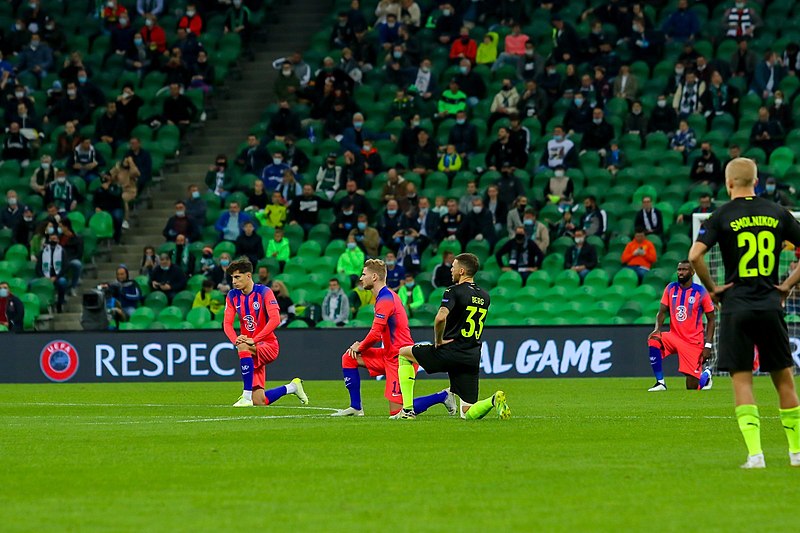English football clubs have been initiating the symbolic stance since June 2020, but some players are beginning to question its real worth.
Colin Kaepernick was the first sporting professional to take a knee during the national anthem of an NFL game in 2016; he later explained that he would not stand for a flag, and nation, that was discriminatory against his own race. This move of unification has since rippled through each corner of the sporting world.
Four years on, taking the knee is commonplace throughout the sporting community, especially within English football clubs. What sparked this trend.
It was event that should never have occurred, yet it has initiated necessary campaigns and protests against police brutality and white supremacy all across the world.
George Floyd’s death in Minnesota, May 2020, shook the world to its core. It facilitated a vital dialogue that our society was belated in accepting to even be a reality. Unarmed, Black and brutalised by American Police Officers, Floyd’s merciless killing has emphasised reflection on our societal attitudes towards marginalized groups more significantly than ever before. Moreover, it has allowed reflection on attitudes to race, and racism, within sports institutions and by their supporters.
In June 2020, the Premier League backed football players from all twenty clubs in their announcement of solidarity for the #blacklivesmatter movement, alongside other well-known football associations. Players’ wish to have their names replaced by ‘Black Lives Matter’ on their kit was further backed by the League; the shirts featured for the first twelve matches in last year’s season. At this time, the players were also supported in their decision to ‘take the knee’ prior to each match – a decision which is still encouraged today.
However, controversies over taking a knee have recently been voiced and initiated by Wilfried Zaha, star-studded striker for Crystal Palace and Côte d’Ivoire, becoming the first to take a stance against this now-routinely practice.
Speaking at the Financial Times ‘Business of Football Summit’, Zaha named the stance as “degrading”. Moreover, he feels it makes him a target for racial abuse: “my parents just let me know that I should be proud to be black no matter what and I feel like we should just stand tall.”
The Palace player states that he will not be commenting on racism anymore, nor will he take a knee due to evident, consistent racial slurs and abuse arising on the pitch and on social media against Black and Asian players. He finally declared: “unless action is going to happen, don’t speak to me about it.”
John Barnes MBE shows his support for Zaha’s decision. Speaking with Sky Sports he claims: “we need to do more than just taking a knee, or as Wilfried Zaha chooses, not to take a knee at all.”
Barnes also comments that footballers can highlight a problem, but they cannot bring about change to that problem. He further reinstates, “it’s not going to change people’s perspectives. There is more that needs to be done with the conversation that is created.”
Derby County, Bournemouth, Brentford and Queens Park Rangers have all put out statements that their players will not be taking a knee before matches because they, and their players, feel the gesture is not enough to combat racism.
Despite these big names of football voicing their disagreement for the stance, some fellow players continue to voice their support for the movement’s continuation. Aston Villa and England centre-back, Tyrone Mings, offers that taking a knee is still necessary for encouraging much-needed consistent dialogue on racism: “It’s for the people that we can’t see and the people that don’t have the voice that we [footballers] have.”
Mings suggests to Sky Sports that players who are not as open to the knee anymore should take their concerns up with senior boards such as the PFA and executives at the FA because, as a community of Black football players, there needs to an increased acceptance for conversations regarding discrimination within the workplace to be allowed, and consistently held.
Furthermore, Mings disputes that the symbolic gesture is becoming diluted in its meaning: “it was only by speaking to people out in the field and out in society that I really got the size and importance of what we’re doing,” a significant demonstration that in taking the knee, people are still responding to it positively.
“If we are not prepared to continue to take the knee, knowing this is probably the only chance we have at keeping the conversation relevant, then really what chance have we got in creating lasting change in the generations to come?”
Spoken with vigour, power and passion, I cannot dispute Tyrone Mings’ opinion, nor can I dispute that of Wilfried Zaha and many other sporting professionals who want to see more change.
One thing I know we all can agree on is that there is no room for racism. None.
These professionals’ words and experiences have significantly stuck with me; as a young adult influenced by the world all too easily, I am hyper-aware of the troubles that our society and institutions infringe on marginalized groups. And for what reason?
No… really, why? Why are we facilitating these absurd behaviours?
I have never seen reason for being racist, nor can I even compute why some individuals are. But, like Tyrone Mings hinted at, people like me don’t have the ability to enforce change as dramatically as people in the spotlight. Therefore, whether it is in continuing to take a knee before each match or ensuring that conversations and more is done in the knee’s place, one thing for certain is that the fight is not over. Our footballers know that; they’re not boycotting a racial protest; they are just asking for real change.
As a society, we have to be louder, more supportive and more willing to learn, because, as a society we have the power to enforce the change they’re pleading for.
By Sophie Avant

